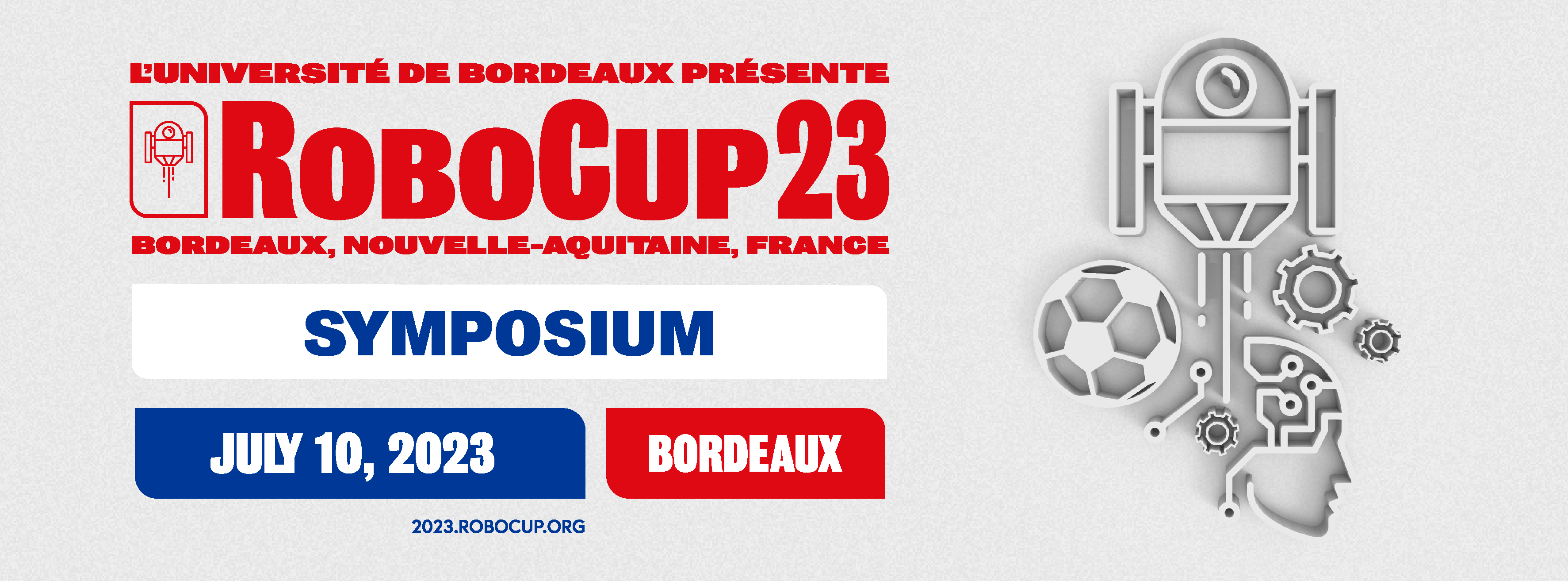Submission deadline : May 1, 2023
Presentation
The 26th RoboCup International Symposium will be held on 10 July 2023, in conjunction with RoboCup23 (July 4 to 10, 2023) in Bordeaux, France.
Focus on Cynthia Breazeal’s speech – Social Robots: Reflections and Predictions of Our Future Relationship with Personal Robots
Cynthia Breazeal is a Professor at the MIT Media Lab where she directs the Personal Robots Group. She also director of the MIT initiative on Responsible AI for Social Empowerment and Education (RAISE) and is MIT Dean of Digital Learning. She is recognized as a pioneer of social robotics and human-robot interaction, is a fellow of the AAAI, and has commercialized personal robots for the home. Her work balances technical innovation in AI, UX design, and understanding the psychology of engagement to design personified AI technologies that promote human flourishing and personal growth in areas such as education, emotional wellness, aging, and more. She is an international award-winning innovator, designer, and entrepreneur. She did her graduate work at the MIT AI Lab and received her doctorate in 2000 in Electrical Engineering and Computer Science from MIT.
Focus DeepMind’s speech : Learning Agile Soccer Skills for a Bipedal Robot with Deep Reinforcement Learning
Bios:
Title – Socio-affective robots: ethical issues
Human-Machine Affective interactions and relationships, in order to audit and measure the potential influence of intelligent and affective systems on humans, and finally to go towards a conception of “ethical systems”, by design or not and to propose evaluation measures. In this
purpose, the planned scientific work focuses on the detection of social emotions in human voice, and on the study of audio and spoken language “nudges”, intended to induce changes in the behavior of the human interlocutor. This work should be complemented by experimental studies (long- term, human vs. machine influence, etc.) to evaluate ethical aspects and confidence in machines, as well as by demystification of these technologies among the general public which naturally tends towards anthropomorphism. The importance of this subject also lies in the variety of its societal applications (from care to the elderly and vulnerable people, to the economy, and education). way.
Bio : Laurence Devillers is a Full Professor of Artificial Intelligence (AI) at Sorbonne University and heads the research team on “Affective and social dimensions in Spoken interactions with (ro)bots: technological and ethical issues” at CNRS-LISN. Since 2020, she also leads the interdisciplinary Chair (including economists, linguists and computer scientists) on AI and digital nudge HUMAAINE: HUman-MAchine Affective INteraction & Ethics at CNRS. Her topics of research are Human-Machine co-evolution: from the modeling of emotions and human-robot dialogue to the ethical impacts for society and the risks and benefits of AI. She is a member of the National Comity Pilot on Ethics of Numeric (CNPEN). She is president of the Foundation Blaise Pascal on cultural mediation on Mathematics and Computer Science. She is responsible of the JTC21/CEN_CENELEC WG4 on Foundational and Societal Impact of AI that include AI-enhanced Nudging, Trustworthiness AI and “Green” AI. She wrote large-audience books : ‘Les robots émotionnels’ (Ed. L’Obs., 2020) and ´Des Robots et des Hommes: mythes, fantasmes et réalité’ (Ed. Plon, 2017).
List of topics
- Robot Hardware and Software
- mobile robotics
- humanoid robotics
- sensors and actuators
- embedded and mobile devices
- robot construction and new materials
- robot system integration
- robot software architectures
- robot programming environments and languages
- real-time and concurrent programming
- robot simulators
- sim2real learning
- Perception and Action
- 3D perception
- distributed sensor integration
- sensor noise filtering
- real-time image processing and pattern recognition
- motion and sensor models
- sensory-motor control
- robot kinematics and dynamics
- high-dimensional motion control
- Robot Cognition and Learning
- world modelling and knowledge representation
- learning from demonstration and imitation
- localisation, navigation, and mapping
- planning and reasoning
- decision making under uncertainty
- neural systems and deep learning
- complex motor skill acquisition
- reinforcement learning and optimisation
- motion and sensor model learning
- Human-Robot Interaction
- robot social intelligence
- fluency of interaction
- speech synthesis and natural language generation
- natural language recognition
- explainable robot behaviours
- emotion recognition and reaction
- understanding human intent and behaviour
- safety, security and dependability
- enabling humans to predict robot behaviour
- Multi-Robot Systems
- team coordination methods
- communication protocols
- learning and adaptive systems
- teamwork and heterogeneous agents
- dynamic resource allocation
- adjustable autonomy
- Education and Edutainment
- robotics and artificial intelligence education
- educational robotics
- robot kits and programming tools
- robotic entertainment
- Applications and Benchmarking
- search and rescue robots
- robot surveillance service and social robots
- robots at home, at work and in public spaces
- robots in the real world
- performance metrics
- human-robot interaction
Submission Guidelines
All papers will be peer-reviewed and evaluated by members of the senior program committee. The proceedings of the RoboCup International Symposium will be published and archived within the Lecture Notes in Artificial Intelligence (LNCS/LNAI) series by Springer-Verlag after the conference. Papers should be formatted following the LNAI author guidelines (https://www.springer.com/gp/
Submissions are limited to 12 pages including references.
Springer’s proceedings LaTeX templates are also available in Overleaf: https://de.overleaf.
Invited Speakers
- Laurence Devillers, Sorbonne University, France (confirmed)
- Cynthia Breazeal, Massachusetts Institute of Technology, USA (confirmed)
Organizing committee
- Cédric Buche, CNRS/ENIB, France – cedric.buche@enib.fr
- Alessandra Rossi, University of Naples Federico II, Italy – a.rossi@herts.ac.uk
- Marco Simões, Universidade do Estado da Bahia, Brazil – msimoes@uneb.br
- Ubbo Visser, University of Miami, USA – visser@cs.miami.edu
Venue
The conference will be held at 43 rue Pierre Noailles, Domaine du Haut Carré 33400 Talence.
Contact
Please feel free to ask for further information by emailing Alessandra Rossi – a.rossi@herts.ac.uk





